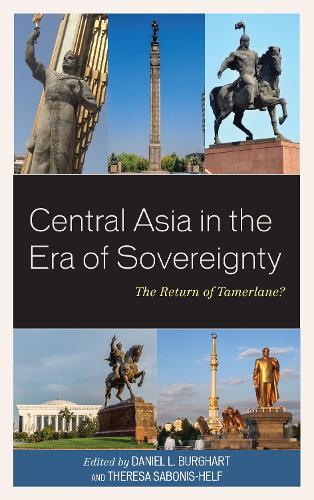
Central Asia in the Era of Sovereignty: The Return of Tamerlane
(Hardback)
Available Formats
Publishing Details
Central Asia in the Era of Sovereignty: The Return of Tamerlane
By (Author) Daniel L. Burghart
Edited by Theresa Sabonis-Helf
Contributions by Laura Adams
Contributions by Svetlana Ancker
Contributions by Daniel L. Burghart
Contributions by Yuhao Du
Contributions by Stacie L. Giles
Contributions by Roger D. Kangas
Contributions by Elena Kovalova
Contributions by Marlene Laruelle
Bloomsbury Publishing PLC
Lexington Books
16th March 2018
United States
Classifications
Professional and Scholarly
Non Fiction
Politics and government
Social and ethical issues
Economics
958.1047
Physical Properties
Hardback
544
Width 161mm, Height 236mm, Spine 48mm
989g
Description
After twenty-five years of independence, there is little doubt that the five Central Asian states will persist as sovereign, independent states. They increasingly differ from each other, and are making their way in global politics. No longer connected only to Russia, they are now connected in important ways to Afghanistan, South Asia, China, Iran, and each other. This volume covers a wide range of issues and presents the work of emerging scholars authors well-known for their expertise in the region. The first part addresses social issues. Covering a wide range from HIV/AIDs to social media, the rebirth of Islam, outmigration, and problematic borders, this section follows two main currents: political development in the region and states responses to transboundary challenges. The second part, addressing economics and security, provides analyses of new infrastructure, informal economies (from bazaars to criminal networks), energy development, the role of enclaves in the Ferghana Valley, and the development of the states military structures. This section illuminates the interactions between economic developments and security, and the forces that could undermine both. The final part, comprised of five case studies, offers a deeper dive into a specific factor that matters in the development of each Central Asian state. These cases include Kazakhstans foreign policy identity, Kyrgyzstans domestic politics, Tajikistans pursuit of hydropower, foreign direct investment in Turkmenistan, and the perception of everyday corruption in Uzbekistan.
Reviews
This is a comprehensive, expertly written and well-documented book on the complex and multifaceted policies of Central Asia. Twenty-one scholarsthe best in the fieldprovide a fascinating account of the rivalries and tensions, the friendships and enmities, the areas of cooperation and the potential for conflict among this group of countries. Both academic and lay readers will find the volume accessible and informative. -- Gawdat Bahgat, National Defense University
This book is an excellent introduction to an historic and increasingly strategic region of the world to which the United States should pay greater attention. The essays cover all the key issues: geopolitics, international relations, security, economic development, social and cultural challenges, and natural resources, especially the vast hydrocarbon deposits of the Caspian basin. From my own twenty years of experience representing the United States in Central Asia, I can tell you that this book gets it right. -- Richard E. Hoagland
Author Bio
Daniel L. Burghart is professor of national security and Eurasian studies at the National Intelligence University. Theresa Sabonis-Helf is professor of national security strategy at the National War College.
